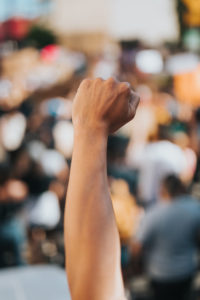What Would a Humanist Do? Celebrating Juneteenth
 Photo by Nathan Dumlao on Unsplash
Photo by Nathan Dumlao on Unsplash Today we bring you our latest installment of “What Would a Humanist Do?”—offering multiple AHA staff opinions on the same question. As with our long-running “Humanist Dilemma” column by Joan Reisman-Brill, readers often ask what qualifies as a humanist problem. Our answer: humanists are committed to being good without a God, but sometimes they need a little advice on how to pull it off.
Q: June 19 was the day in 1865 when the last US slaves learned of their emancipation. While Juneteenth has been celebrated ever since (also called Freedom Day, Jubilee Day, and a few other names) it’s painful to think those Texas slaves had been free for almost two-and-a-half years and didn’t know it. Conversely, too many white Americans only now seem to be learning that racism in America never ended. I’m white and want to take part in commemorating Juneteenth but am not sure how.
—What Would a Humanist Do?
A’s:
(From a fellow white person): I think it’s just like you said—white people are still learning. For example, it was pointed out to me that a shift from using the term “slaves” to “enslaved people” aims to elevate the humanity of the persons being described. There’s a long way to go, but days like Juneteenth offer opportunities for white Americans to be intentional about our education and about educating other white people in our lives. If you haven’t yet read So You Want to Talk About Race?, The New Jim Crow, or The Color of Law, I recommend picking up a copy of one (or all three), diving in on Juneteenth, passing it along to another white person when you finish, and discussing the book with them after they finish too. I also strongly recommend getting involved locally with other white folks working on anti-racism. My local SURJ chapter hosts reading groups on anti-racism, canvases in white-majority neighborhoods to dialogue about race, and supports local racial justice initiatives led by communities of color. (SURJ is an acronym for Showing Up for Racial Justice, which is part of a national network of groups that organize white people to dismantle white supremacy.) Ultimately, while we continue to learn and show up as imperfect and ever-learning allies, Juneteenth is another opportunity for white people to resource anti-racist work being led by people of color by opening our proverbial checkbooks.
—Rachel Deitch
I fall into the embarrassingly large camp of people who vaguely knew that Juneteenth existed, but only recently learned precisely what the day signifies. Just as white indifference (and, sure, the remoteness of Texas at the time) led to a two-and-a-half year delay in enslaved people in Texas learning they were free, white indifference also leads to the continued prevalence of structurally racist systems of oppression.
There is undoubtedly a surge of Juneteenth recognition happening right now—massive companies like Target, Nike, and Mastercard have announced they will observe Juneteenth as a paid holiday. The governor of Virginia has made moves to formalize state observance. And here at the AHA we will, for the first time ever, close our offices to recognize Juneteenth. Holiday recognition is certainly a powerful symbol of awareness, but there is so much more we can do on the nineteenth and beyond to help gradually steer us in the direction of meaningful change.
- If you’re able to,set up a recurring donation on June 19 or on the nineteenth monthly to an organization that aligns with your values. For example, I’ve donated to Black Girls Code, a nonprofit that empowers girls of color to become innovators in STEM fields.
- Research and find black-owned businesses to support in your local community on the nineteenth and beyond. There are several lists going around in my city listing everything from restaurants to clothing boutiques to hardware stores.
- Find a nearby protest or demonstration to attend to show solidarity and demand change from your local or state government.
You can find many more resources and ideas for action here.
—Peter Bjork
The best way to commemorate Juneteenth is to learn about and discuss why it was established and how America’s history of slavery developed into generations of racial inequality. There are lots of articles and talks online, and I strongly recommend everyone visit the National Museum of African American History & Culture (both online and at some point in person) and watch The 13th, a documentary on how the prison system continues to enslave African Americans today. As we reflect on the past, we must also apply that awareness and knowledge to a more just future for all. Donate to social justice organizations, support black-owned businesses, and fight for racial justice on every level of society.
—Emily Newman
For humanist advice from multiple perspectives on all manner of situations, please send your question to wwhd@americanhumanist.com.
